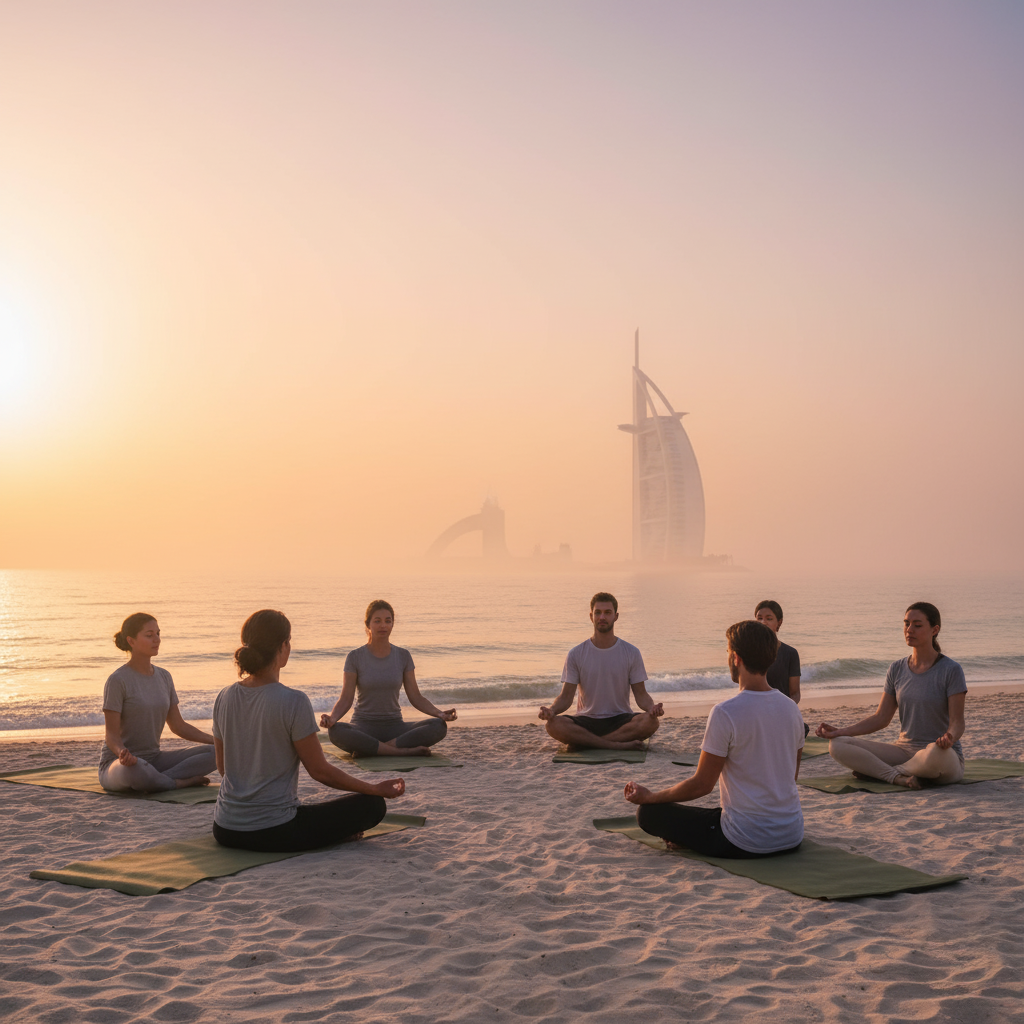The emails blur together. The once-exciting skyline of Dubai or Abu Dhabi now just feels like a backdrop to endless workdays. You’re performing, hitting targets, and maintaining a brave face for colleagues and family back home, but inside, you feel like you’re quietly cracking. If this sounds familiar, you are not alone. Life as an expat in the UAE is a unique blend of incredible opportunity and immense pressure, and it’s taking a toll. Burnout treatment in the UAE is an available option.
Burnout is more than just stress; it’s a state of profound emotional, physical, and mental exhaustion. And in the fast-paced professional landscape of the UAE, it’s reaching epidemic levels. But recognizing the problem is only the first step. Navigating the path to recovery can feel overwhelming, especially when you’re far from your traditional support systems.
This is your definitive, all-in-one survival guide. We’re moving beyond generic advice to provide a clear, culturally-aware recovery blueprint specifically for expatriates in the UAE. We will help you identify the signs, provide a step-by-step personal recovery plan you can start today, and offer a transparent directory of the best local resources—from therapists and clinical programs to wellness retreats. It’s time to stop just surviving and start thriving again.
Are You Burning Out? Recognizing the Signs as an Expat in the UAE
Burnout isn’t a sign of weakness; it’s a sign you’ve been strong for too long. In the UAE’s high-performance culture, the line between ambitious drive and chronic exhaustion is dangerously thin. A landmark 2023 workplace wellness study by KPMG found that over 55% of professionals in the UAE reported symptoms of burnout.[1] This isn’t just a feeling; it’s a widespread issue acknowledged by local health authorities. The Dubai Health Authority (DHA) has also noted the rise in stress-related conditions, underscoring the urgency of addressing this challenge.[2]
The World Health Organization officially recognizes burnout as an “occupational phenomenon” resulting from chronic workplace stress that has not been successfully managed. You can learn more about the official WHO Definition of Burnout.
But how do you know if what you’re feeling is burnout, simple stress, or something more serious like depression? While they can overlap, they have key differences.
| Symptom Category | Stress | Burnout | Depression |
|---|---|---|---|
| Primary Emotion | Over-engagement, anxiety, hyperactivity | Disengagement, emotional blunting, helplessness | Pervasive low mood, hopelessness, loss of pleasure |
| Energy Level | Urgency and hyperactivity, leading to fatigue | Emotional and physical exhaustion, depletion | Lack of energy and motivation for most activities |
| Outlook | Can still imagine feeling better once the stressor is gone | Cynicism, detachment from work and others | Negative feelings extend to all areas of life, not just work |
| Impact | Primarily physical (headaches, stomach issues) | Primarily emotional (feeling empty, lack of motivation) | Both emotional and physical, with a sense of worthlessness |
Source: Definitions adapted from leading health resources like Healthline.[3]

Beyond Tired: The Key Symptoms of Emotional Exhaustion
Burnout typically manifests across three core areas. As you read these, see if they resonate with your experience.
- Emotional Exhaustion: This is the hallmark of burnout. It’s a feeling of being completely drained and having nothing left to give. You might feel cynical about your job, irritable with colleagues, or emotionally detached from your work and even your personal life. That passion you once had for a project is replaced by a sense of dread.
- Cognitive Issues: Are you finding it hard to concentrate? Making careless mistakes? Burnout significantly impacts your ability to focus and remember things. This “brain fog” isn’t just in your head; it’s a real neurological symptom of chronic stress, as described by mental health platforms like Talkspace.[4]
- Physical Fatigue: This isn’t the kind of tiredness that a good night’s sleep can fix. It’s a bone-deep exhaustion that lingers day after day. You might also experience physical symptoms like headaches, stomach problems, or increased susceptibility to colds and flu.
The Expat Pressure Cooker: Why Burnout Hits Differently Here
While anyone can experience burnout, the life of an expatriate professional in the UAE adds unique layers of pressure that can accelerate the process.
- Hyper-Competitive Work Culture: The “work hard, play hard” mantra is pervasive, often blurring the lines between work and life. The pressure to constantly perform at a high level to justify your position is immense.
- Lack of Job Security: For many, a visa is tied directly to a job. The fear of losing your employment isn’t just about income; it’s about your right to remain in the country, which adds a profound layer of chronic work stress.
- Distance from Support Systems: When you’re thousands of miles from family and lifelong friends, your usual emotional safety net is gone. You can’t just drop by your parents’ house after a tough week. This social isolation can make workplace challenges feel insurmountable.
- The “Always On” Expectation: As one marketing director in Dubai shared anonymously, “The time zones mean you’re never truly off. I’d finish my day, and then the emails from the US team would start. I felt guilty for not being available. It was a slow grind that just wore me down until I had nothing left.”
These factors create a perfect storm where the normal stresses of a demanding job are amplified, making expats particularly vulnerable to burnout.

Your Personal Burnout Recovery Plan: A Step-by-Step Blueprint
Recovering from burnout is not a sprint; it’s a marathon that requires a conscious, structured approach. While professional help is invaluable (and we’ll cover that next), your personal recovery plan is the foundation. This section is your toolkit, based on evidence-based strategies from resources like PositivePsychology.com, to help you take back control.[5]
To make this even more actionable, we encourage you to create your own “Burnout Recovery Plan” worksheet. Use these phases as your guide to build a personalized path back to well-being.
Phase 1: Acknowledge and Create Space
The first step is the hardest: you must admit to yourself that you are burned out and that it’s okay to press pause.
- Acknowledge the Reality: Stop telling yourself to “push through it.” Verbally acknowledge it, either to yourself or a trusted confidant: “I am experiencing burnout, and I need to take action.”
- Talk to Someone: This could be a spouse, a close friend, or even a manager you trust. Voicing your struggle lifts a significant burden and is the first step toward building a support system here in the UAE.
- Schedule Time Off: This is non-negotiable. Whether it’s a long weekend, a full week, or applying for a mental health day, you need to create a deliberate break from your stressors. This isn’t a vacation; it’s a convalescence.
Phase 2: The Four Pillars of Recovery
During your time off and as you reintegrate, focus your energy on these four essential pillars.
Pillar 1: Prioritize Deep Rest
Burnout recovery requires a level of rest that goes far beyond sleep. It’s about restoring your depleted nervous system.
- Digital Detox: Schedule hours—or even a full day—where you completely disconnect from screens. No work emails, no social media scrolling, no news alerts. Let your brain be quiet.
- Embrace “Doing Nothing”: Give yourself permission to be unproductive. Sit on your balcony with a cup of tea, listen to music, or simply watch the world go by without a goal or a to-do list. This is active rest for a burned-out mind.
Pillar 2: Set and Enforce Boundaries
Burnout often stems from a lack of boundaries. Reclaiming your time and energy is critical for recovery and prevention.
- Define Your Work Hours: Set a firm time to log off each day—and stick to it. Turn off notifications on your phone and laptop outside of these hours.
- Practice Saying ‘No’: You don’t have to take on every project or request. Use clear, polite scripts. For example: “Thank you for thinking of me for this, but my plate is full right now, and I need to focus on my current priorities to do them well.”
Pillar 3: Re-engage with Mindful Activity
The goal here is not to fill your schedule but to reconnect with activities that energize you rather than drain you.
- Gentle Movement: Instead of a high-intensity workout that might feel like another chore, opt for a restorative walk on the beach, a gentle swim, or a beginner’s yoga class.
- Rediscover Hobbies: What did you love to do before work consumed everything? Pick up that paintbrush, camera, or book. The goal is engagement for the sake of joy, not accomplishment.
Pillar 4: Practice Mindfulness and Self-Compassion
Your inner critic likely worked overtime during your burnout. It’s time to replace it with a voice of compassion.
- Simple Mindfulness: You don’t need to meditate for an hour. Start with a two-minute breathing exercise. Inhale for four counts, hold for four, and exhale for six. This simple act can calm your nervous system instantly.
- Self-Compassion: Treat yourself with the same kindness you would offer a friend going through a difficult time. Acknowledge that recovery takes time and that it’s okay to have good days and bad days.

Finding Professional Burnout Treatment in the UAE: Your Complete Directory
While a personal recovery plan is essential, sometimes you need professional guidance to navigate the path back to health. The UAE has a growing landscape of high-quality mental health and wellness support. This directory is designed to help you understand your options.
For official government-backed resources and initiatives, a great starting point is the UAE National Program for Wellbeing.
When to Seek Professional Help
If your symptoms are severe, persistent, or if you’re experiencing feelings of hopelessness, it’s crucial to consult a professional. According to medical authorities like Harvard Health, red flags include a significant change in sleep or appetite, thoughts of self-harm, or an inability to function in your daily life.[6] A general practitioner (GP) is an excellent first point of contact to rule out any underlying medical conditions and get a referral.
Therapy & Counseling in Dubai and Abu Dhabi
Outpatient therapy is one of the most effective treatments for burnout. It provides you with tools and strategies to manage stress, change thought patterns, and build resilience.
A particularly effective method is Cognitive Behavioral Therapy (CBT). CBT helps you identify and challenge the negative thought patterns and behaviors that contribute to burnout, replacing them with healthier, more adaptive ones.
Reputable Clinics in the UAE:
- CHMC German Clinic (Dubai): Known for its multidisciplinary team, this clinic specifically offers Cognitive Behavioral Therapy (CBT) as a proven method for burnout treatment.[7]
- Vivamus (Dubai): This center provides access to a team of licensed psychologists who specialize in helping clients navigate stress, anxiety, and burnout, offering a tailored therapeutic approach.[8]
Clinical Recovery Programs and Hospitals
For severe cases of burnout that require a more intensive and structured approach, several accredited hospitals in the UAE offer specialized mental health programs, both on an inpatient and outpatient basis.
When evaluating these facilities, look for Joint Commission International (JCI) Accreditation. This is a globally recognized gold standard for patient care and safety, indicating the facility meets rigorous performance standards.
Accredited Facilities:
- Al Amal Psychiatric Hospital (Dubai): As a government-run, JCI-accredited hospital, Al Amal is a leading institution for comprehensive mental healthcare in the region.[9]
- Fakeeh University Hospital – Mindcare (Dubai): This JCI-accredited facility offers integrated mental health services. For those considering intensive private care, it’s important to be aware of the investment; a program at Fakeeh University Hospital – Mindcare has an estimated cash pay price of $12,000-$15,000 per week.[10]

Immersive Wellness Retreats Across the UAE
If you’re looking for a holistic approach that combines mental rest with physical rejuvenation, a wellness retreat can be a powerful catalyst for recovery. These are not clinical programs but rather immersive experiences focused on de-stressing, detoxing, and resetting your mind and body.
Leading Wellness Retreats:
- ZOYA Health & Wellbeing Resort (Ajman):
- Philosophy: A science-backed, medical-first approach to wellness, offering specialized programs in detox, weight management, and rejuvenation.
- Best For: A medical detox and a data-driven approach to resetting your health.[11]
- The Retreat Palm Dubai MGallery by Sofitel:
- Philosophy: Officially recognized as Dubai’s first 5-star holistic wellbeing resort, it focuses on a complete mind-body-spirit approach with programs designed by wellness experts.
- Best For: Holistic healing and a luxury escape focused on mental and emotional balance.[12]
Immediate Stress Relief: Activities and Sanctuaries in Dubai
Sometimes you just need a quick reset—an immediate escape from the pressures of the day. Dubai offers a surprisingly diverse range of activities to help you decompress, catering to every budget.
For Mindfulness & Movement
- Yoga Studios: Find your flow at one of the city’s many top-tier yoga studios, offering everything from relaxing Yin to dynamic Vinyasa.
- Meditation Centers: Join a guided meditation session to quiet your mind and cultivate a sense of inner peace.
For Nature & Tranquility (Free & Low-Cost Options)
- A Walk on Kite Beach: The simple combination of sea air, sand between your toes, and the view of the Burj Al Arab can be incredibly grounding.
- Safa Park: This lush green oasis in the heart of the city is perfect for a quiet walk, a picnic, or simply lying on the grass and reading a book.
- Al Qudra Lakes: Escape the city entirely and watch the sunset over the desert dunes. The tranquility and open space are a powerful antidote to urban stress.
For a Luxury Escape
- World-Class Spas: Indulge in a restorative massage or treatment. A prime example is AWAKEN Wellness at Atlantis, The Palm, which offers a sanctuary of relaxation and rejuvenation designed to soothe a stressed mind and body.

Preventing a Relapse: Building a Burnout-Proof Life in the UAE
Recovery is the first step; prevention is the long-term goal. Chronic, unmanaged stress has serious long-term health consequences, a fact emphasized by public health bodies like the Centers for Disease Control and Prevention (CDC).[13] Building a more resilient lifestyle is not a luxury; it’s a necessity.
- Integrate “Micro-Breaks”: You don’t need a week off to de-stress. Integrate 5-10 minute breaks throughout your workday to stretch, walk away from your desk, or practice a brief mindfulness exercise.
- Schedule Your Priorities, Not Just Your Work: Block out time in your calendar for exercise, hobbies, and social connections with the same seriousness you would a business meeting.
- Conduct a Weekly “Energy Audit”: At the end of each week, reflect on what activities drained you and what energized you. How can you minimize the drains and maximize the energizers in the week ahead?
- Build Your “Expat Family”: Actively cultivate a strong social circle outside of work. Having friends who understand your unique challenges and can offer mutual support is one of the most powerful buffers against burnout.
For more in-depth strategies, exploring resources on Burnout Prevention Strategies can provide additional valuable insights.
Your Path Forward Starts Now
Burnout among expatriates in the UAE is a serious and growing challenge, fueled by a unique combination of professional pressure and social isolation. But it is not a life sentence. Recovery is entirely possible with a conscious and compassionate approach.
By recognizing the specific signs of burnout in your own life, implementing a structured personal recovery plan, and knowing when and where to seek professional help from the UAE’s excellent network of providers, you can reclaim your health and well-being. This guide has given you the map and the tools. The first step on the path back to a vibrant, fulfilling life is yours to take.
Download your free Burnout Recovery Plan worksheet now and take the first step towards reclaiming your well-being.
This article is for informational purposes only and does not constitute medical advice. Please consult with a qualified healthcare professional for any health concerns or before making any decisions related to your health or treatment.
References
- KPMG. (2023). UAE workplace wellness study.
- Dubai Health Authority (DHA). (N.D.). [General publications on stress-related conditions].
- Healthline. (N.D.). Emotional Exhaustion: What It Is and How to Treat It. Retrieved from https://www.healthline.com/health/emotional-exhaustion
- Talkspace. (N.D.). What Is Emotional Exhaustion?. Retrieved from https://www.talkspace.com/blog/emotional-exhaustion/
- PositivePsychology.com. (N.D.). How to Recover From Burnout: 12 Strategies & Exercises. Retrieved from https://positivepsychology.com/how-to-recover-burnout/
- Harvard Health Publishing. (N.D.). Energy & Fatigue Topics. Retrieved from https://www.health.harvard.edu/topics/energy-and-fatigue
- CHMC German Clinic Dubai. (N.D.). Burnout Syndrome. Retrieved from https://chmc-dubai.com/disorders/burnout-syndrome/
- Vivamus. (N.D.). Stress and Burnout. Retrieved from https://vivamus.me/challenges-we-work-with/stress-and-burnout/
- Al Amal Psychiatric Hospital. (N.D.). [Official Website/Accreditation Information].
- Fakeeh University Hospital – Mindcare. (N.D.). [Official Website/Program Information].
- ZOYA Health & Wellbeing Resort. (N.D.). Retreats. Retrieved from https://zoyawellbeing.com/retreats/
- The Retreat Palm Dubai MGallery by Sofitel. (N.D.). Official Website. Retrieved from https://all.accor.com/hotel/A9Q6/index.en.shtml
- Centers for Disease Control and Prevention (CDC) / NIOSH. (N.D.). STRESS…At Work. Retrieved from https://www.cdc.gov/niosh/docs/99-101/default.html



